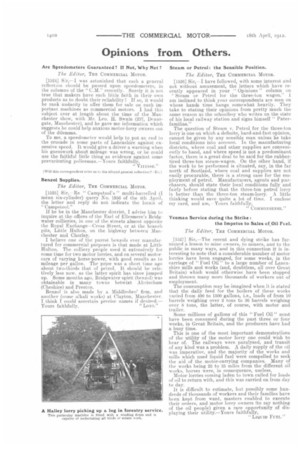Opinions from Others.
Page 18

If you've noticed an error in this article please click here to report it so we can fix it.
Are Speedometers Guaranteed ? II Not, Why Not ? The Editor, THE COMMERCIAL MOTOR.
[1524] Sir,—I was astonished that such a general reflection should be passed upon speedometers, in the columns of the " CM." recently. Surely it is not true that makers have such little faith in their own products as to doubt their reliability ? If so, it would be rank audacity to offer them for sale on such important machines as commercial motors. I had this subject over at length about the time of the Manchester show, with Mr. Leo. IL Swain (237, Deansgate, Manchester), and he gave me information which suggests he could help anxious motor-lorry owners out of the dilemma..
To me, a speedometer would help to put an end to the crusade in some. parts of Lancashire against excessive speed. It would give a driver a warning when his guesswork abodt mileage was wrong, or he could use the faithful little thing as evidence against some prevaricating policeman.—Yours faithfully, VITESSE."
[Will this correspondent refer us to the alIeged general reflection ?—En.1 Benzol Supplies.
The Editor, THE COMMERCIAL MOTOR.
[1625] Sir,---Re " Campstool's " multi-barrelled (I mean six-cylinder) query No. 1956 of the 4th April, the letter and reply do not indicate the locale of " Camp sto ol."
If he be in the Manchester district, I advise him to inquire at the offices of the Earl of Ellesmere's Bridgwater collieries, in one of the streets almost opposite the Royal Exchange—Cross Street, or at the branch pits, Little Hulton, on the highway between Manchester and Chorley.
I believe one of the purest benzols ever manufactured for commercial purposes is that made at Little Milton. The colliery people used it extensively for some time for two motor lorries, and on several motorcars of varying horse-power, with good results as to mileage per gallon. The price was a short time ago about two-thirds that of petrol. It should be relatively less now, as the latter spirit has since jumped up. Some months ago. Bridgwater spirit (benzol) was obtainable in many towns betwixt Altrincham (Cheshire) and Preston.
Benzol is also made by a Middlesbro' fiini, and another (some alkali works) at Clayton, Manchester. I think I could ascertain precise names if desired.— Yours faithfully, " LOTO." Steam or Petrol: the Sensible Position.
Tine Editor, THE COMMERCIAL MOTOR.
[1526] Sir,—I have followed, with some interest and not without amusement, the letters which have recently appeared in your " Opinions " column on " Steam or Petrol for the three-ton wagon." i am inclined to think your correspondents are men on whose hands time hangs somewhat heavily. They take to stating their opinions from pretty much the same reason as the schoolboy who writes on the state of his local railway station and signs himself " Paterfamilias."
The question of Steam v. Petrol for the three-ton lorry is one on which a definite, hard-and-fast opinion, cannot be given by any sensible man unless he take local conditions into account. In the manufacturing districts, where coal and other supplies are conveniently to hand, and where speed is not a predominant factor, there is a great deal to be said for the rubbertired three-ton steam-wagon. On the other hand, if the work to be performed is situated, say, in the far north of Scotland, where coal and supplies are not easily procurable, there is a strong case for the employment of petrol. Manufacturers, agents and purchasers, should state their local conditions fully and fairly before stating that the three-ton petrol lorry is better than the three-ton steam-lorry. A little thinking would save quite a lot of time. I enclose my card, and am, Yours faithfully, " COMMONSENSE."
Yeoman Service during the Strike : the Impetus to Sales of Oil reef.
The Editor, THE COMMERCIAL MOTOR,
[1527] Sir,—The recent and dying strike has furnished a lesson to mine owners, to miners, and to the public in many ways, and in this connection it is interesting to note that a considerable number of motor lorries have been engaged, for some weeks, in the carriage of " Fuel Oil" to a large number of Lancashire mills and works (and, doubtless, all over Great Britain) which would otherwise have been stopped and thrown many more thousands of workers out of employment.
The consumption may be imagined when it is stated that the daily feed for the boilers of these works varied from 400 to 1500 gallons, i.e., loads of from 10 barrels weighing over 2 tons to 36 barrels weighing over 8 tons, the latter, of course, with motor and trailer.
Some millions of gallons of this " Fuel Oil" must have been consumed during the past three or four weeks, in Great Britain, and the producers have had a busy time.
This is one of the most important demonstrations of the utility of the motor lorry one could wish to hear of. The railways were paralysed, and transit of any kind was a problem. A daily supply of the oil was imperative, and the majority of the works and mills which used liquid fuel were compelled to seek the aid of the motor-carrying companies. Many of the works being 25 to 35 miles from the different oil works, horses were, in consequence, useless.
Motor lorries coming laden to town called for loads of oil to return with, and this was carried on from day to day.
It is difficult to estimate, but possibly some hundreds of thousands of workers and their families have been kept from want, masters enabled to execute their orders, and motor lorry owners (to say nothing of the oil people) given a rare opportunity of displaying their utility.—Yours faithfully,
LIQUID FUEL.I'






















